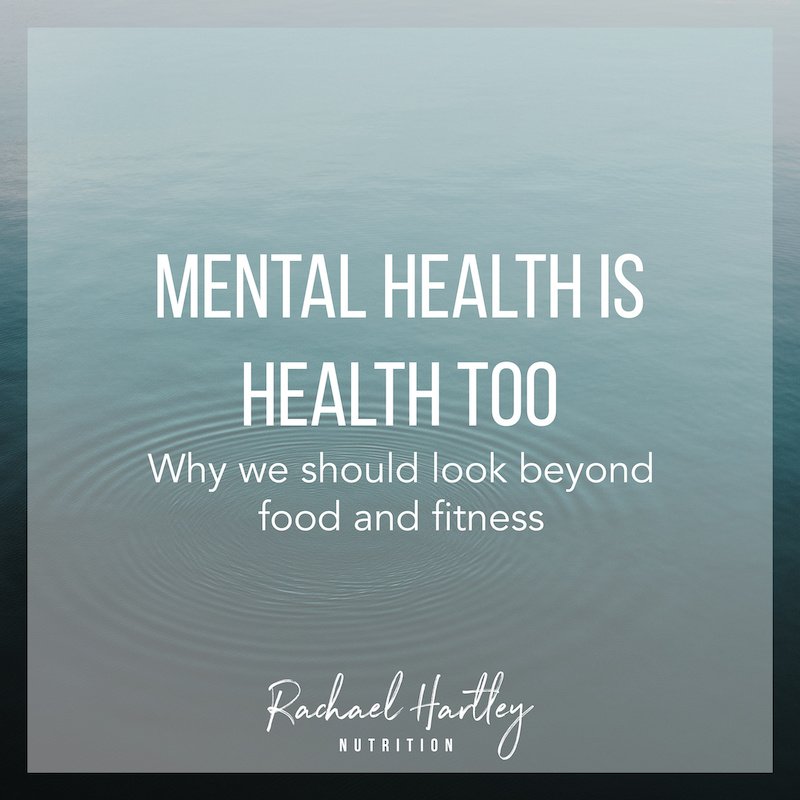
When I was in school to become a dietitian, I had a very narrow view of what health looked like. It became even more narrow after I graduated, started practicing as a dietitian, and discovered the extremely disordered world of healthy living blogs and clean eating.
At the time, I thought of health in terms of food and fitness, both for myself and for the patients at the hospital I worked at. In hindsight, I can see that my anxiety latched on to the suffering and trauma I saw in the hospital, and started to focus on health as a way of controlling those fears. I became intensely focused on food and exercise. Thankfully, my behaviors never rose to the level of an eating disorder or compulsive exercise – I would joke that I was perfectionist in my expectations rather than my follow through. Still, the obsessions over food, exercise and my health created quite a bit of stress in my life.
On the surface, I appeared “healthy,” or at least, according to our extremely superficial cultural conception of health. Because my behaviors around food and exercise were never extreme, most people would think of me as someone who had healthy habits. I exercised the recommended amount. I ate plenty of fruits and vegetables. I watched my portion sizes and cooked most of my meals at home. So I was healthy, right?
Looking back, healthy is not the word I would use to describe myself. I was struggling with pretty debilitating anxiety, felt constantly exhausted despite getting enough sleep, and my stomach was always in anxious knots, sometimes intensifying to the point where I was crippled over in pain. I felt lonely and unfulfilled in most of my relationships. I struggled with low self worth. At this point in my life, not only was I unhealthy, but I would describe myself as a bit of a hot mess.
While I was intensely preoccupied with my physical health, I overlooked the fact that mental health is health too, and may even be more important for physical health than food and fitness. I spent so much headspace obsessing over eating and exercising the “right” way that I didn’t have any mental energy left over for things like therapy, healthy communication and social connection, or engaging in hobbies. Both my physical health and my mental health suffered.
Mental Health is Health Too
While western culture tends to view the brain and body as two separate entities, most other cultures think of the brain and body as being interconnected. This is borne out in research, especially in the ever evolving field of microbiota and the gut-brain connection. In my experience, most people understand that physical health can impact mental health, that if someone is struggling with physical health conditions it could contribute or lead to depression or anxiety. But that connection works two ways, and depression, anxiety, and trauma can have an impact on physical health.
We see this with psychosomatic conditions (now called psychophysiological, to validate the fact that symptoms are real and not in someone’s head). While these conditions have psychological roots rather than physical causes, the physical symptoms are very much real. Psychophysiological disorders can include chronic migraines, chronic fatigue, fibromyalgia, and IBS (I’ll note that these conditions can all have physical roots, or a combination of physical and psychological roots).
The connection between brain and body doesn’t have to rise to the level of a diagnosis for it to have an impact on one’s physical health. Another example of where mental health can impact physical is through the HPA axis and allostatic load. The HPA axis is the connection from the hypothalamus, pituitary, and adrenal glands, which is how the body regulates and responds to stress. The result is the release of cortisol, a stress hormone that while important in response to acute stress, can add to allostatic load, or the cumulative “wear and tear” on the body. This high allostatic load can have more “minor” affects on physical health, like frequent headaches, fatigue, and stomach issues, but also chronically high levels of cortisol have been linked to more significant chronic diseases like diabetes, cardiovascular disease, and cognitive decline.

.jpg?format=1500w)



More Stories
Avocado Cacao Mousse – JSHealth
Janelle Brown on Garrison’s Mental Health Before His Death
How To Finally Beat Insomnia